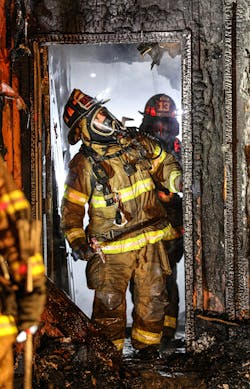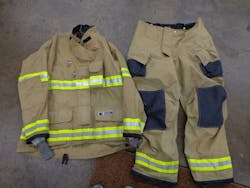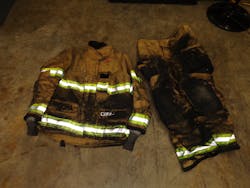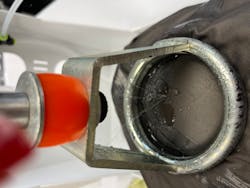Identifying independent service providers (ISPs) that possibly are qualified to service your department’s PPE care/maintenance begins with keying on their capability to meet the specifications of the 2020 edition of NFPA 1851: Standard on Selection, Care, and Maintenance of Protective Ensembles for Structural Fire Fighting and Proximity Fire Fighting. Then, depending on the scope of the project and department needs, you should evaluate a few ISPs that you encounter.
ISP verification
Ask the ISP to provide you with a copy of its NFPA 1851 (2020 edition) verification certificate. The 2020 edition requires an ISP to be verified for the service(s) that it performs. There are two categories:
A verified cleaner performs cleaning only. Performing advanced inspection or any type of repair isn’t permitted.
Note: Firefighting duties often cause wear to gear. At the very least, you can expect broken stitches on reflective trim and some seams to begin to come undone. What isn’t obvious visually is wear to the inner liner. A verified cleaner isn’t permitted to perform the advanced inspection that would reveal potentially serious firefighter safety wear needs. More times than not, most of your gear must come out of service for some type of safety-related repair.
A verified ISP performs cleaning, advanced inspection and repairs. Verification includes announced and unannounced site audits that are performed every six months by a third-party verification agency. The purpose of this is to ensure that the ISP fulfills what’s required of it by NFPA. If an ISP won’t provide a copy of its certificate, it likely means that it isn’t verified to the 2020 edition of NFPA 1851. Choosing to utilize that ISP’s services might place unnecessary risk on you, the chief and the department.
Utilizing an ISP that’s in your department’s region can be beneficial when it comes to pickup and delivery, after-hours service, decreased turnaround time and the capability for your department to quality control the ISP’s operation at any time.
Also, most ISPs that you encounter offer complementary cleaning and repair for at least one set (coat and pant) of PPE. This free trial allows you to evaluate cleaning effectiveness, quality of repair, turnaround time and overall service.
Turnaround time is important (be sure to record the amount of time that you were without your PPE), but remember to consider that, because this is a free trial, the ISP might have fast-tracked your PPE ahead of all other customers. Unless you stipulate a fixed turnaround schedule, you can expect an ISP’s turnaround queue to be first come, first served. The busier that the ISP is, the longer the turnaround will be for your gear.
In regard to quality of service and maintenance, upon the return of the PPE, open the box and note what you see. If multiple sets were sent to the ISP, were they returned and identified as a set (for example, was Firefighter Jones’ set kept together)? Are the liners properly installed in the outer shells?
As far as cleanliness, take a piece of white paper and rub it on the garment. Does soil transfer onto the paper? Rub the same piece of paper on knee and cuff reinforcements. Is the paper still clean?
Repairs that are performed must be consistent with manufacturer construction. Is the same thread used? Are there the same number of stitches? Is the stitching straight? Is the color of the thread that was used consistent with the rest of the garment? Are all of the seams consistent with manufacturer construction? If holes that were in the garment were patched, was the same material used to apply the patch?
Take time to review and understand each ISP’s price sheet. Generally, you will find two types of price sheets: fixed and a la carte.
Fixed price sheets have fixed prices for maintenance work that’s carried out (i.e., D-ring replacement, which includes the cost of broken D-ring removal, two rivets, new D-ring and labor for installation).
A la carte price sheets price out each facet of maintenance separately. When maintenance items are totaled together, generally, that total amount is more than the expense from a fixed price sheet.
Also, has the ISP provided you with a report that details, at minimum, the following aspects of its work:
- Person to whom item is issued when received by ISP for maintenance?
- Manufacturer’s identification number, lot number or serial number?
- Date of advanced inspection?
- Date of advanced cleaning?
- Date of repair?
- Who performed the repair?
- Description of repair?
If the ISP doesn’t provide you with this report, ask for it. It also is a good idea to ask the ISP whether it can export your maintenance data to a spreadsheet.
No matter whether the ISP can do that data exporting, it can work to your advantage to create your own worksheet. List all of the job characteristics that you want in an ISP down the left margin. Assign a column for each ISP and record how each handled each aspect of service. As you review the ISPs’ service, you will learn more and more about performance. The same goes regarding costs: Each time that you learn of a specific item that a firm includes in the price or charges as an extra, make a note of it.
With your worksheet completed, you will be in a good position to make an informed decision. Price on its own doesn’t mean much, but when you know exactly what a price includes and excludes, you can decide which company offers you the best value.
ISP Credentials
When you interview an ISP, inquire about:
- How long has it been in business? Think back to when you started recruit school. Now think of the training, lessons and experience that you’ve gained through the years. The person who you are today might be quite a bit different than the person who you were when you started. Selecting an ISP who has experience will help you to navigate NFPA requirements as well as provide a source of useful tips on how to best implement a program to help your department to reach its goals.
- Does the ISP provide service to departments that are of a similar size to your department and that have the same scope of work that you have? Obtain a reference list and follow up. It’s easy for an ISP to say that it can do something. Get the facts from your peers.
- Is the ISP permitted to perform warranty repairs on behalf of the manufacturer(s) of the PPE that your members wear? Convenience is everything. No one wants to extend turnaround times any longer than they must be.
- Does the ISP actively participate within NFPA or belong to an association, such as Verified Independent Service Provider Association (VISPA)? Firefighters continually train, learn and seek to improve best practices. Apply the same principles to an ISP. Being an active participant in NFPA or an association demonstrates an ISP’s desire to offer its best service while it makes strides to improve the industry that it serves.
- Does the ISP provide moisture-barrier warranty coverage? The moisture-barrier system of your department’s PPE inner liner is under warranty, including parts and labor, by the moisture barrier manufacturer (either Stedfast or W.L. Gore). Depending on the barrier, the warranty covers either four, five or seven years from the date of manufacture. The need for repair to the inner liner is common. Ask the ISP to provide you with an example (quote and/or paid invoice), so you can see how your department will benefit from warranty coverage.
About the Author
Brian Marenco
Brian Marenco has 26 years of experience serving the fire service. He currently is the director of business development for Minerva Bunker Gear Cleaners. Marenco provides training in regard to NFPA 1851: Standard on Selection, Care, and Maintenance of Protective Ensembles for Structural Fire Fighting and Proximity Fire Fighting and helps organizations and end users across North America to implement NFPA 1851 programs.



